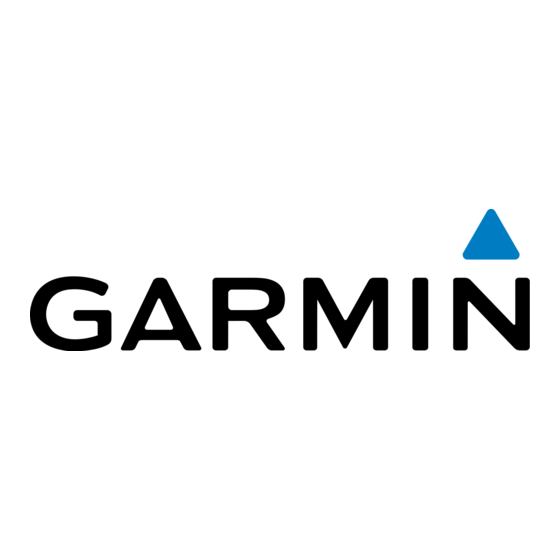Garmin GPSMAP 721 Manual do Proprietário - Página 15
Procurar online ou descarregar pdf Manual do Proprietário para Sistema GPS marítimo Garmin GPSMAP 721. Garmin GPSMAP 721 38 páginas. Important safety and product information
Também para Garmin GPSMAP 721: Manual de início rápido (4 páginas), Manual de instruções de instalação (8 páginas), Informações sobre o produto (20 páginas)

and avoid any land, shallow water, or other obstacles that may
be in your path.
When using Go To, a direct course and a corrected course may
pass over land or shallow water. Use visual sightings, and steer
to avoid land, shallow water, and other dangerous objects.
NOTE: Auto Guidance is available with premium charts, in
some areas.
You must create a waypoint before you can navigate to a
waypoint.
1
Select Nav Info > Waypoints.
2
Select a waypoint.
3
Select Navigate To.
4
Select an option:
• To navigate directly to the location, select Go To.
• To create a route to the location, including turns, select
Route To.
• To use Auto Guidance, select Guide To.
5
Review the course indicated by the magenta line.
NOTE: When using Auto Guidance, a gray segment within
any part of the magenta line indicates that Auto Guidance
cannot calculate part of the Auto Guidance line. This is due
to the settings for minimum safe water depth and minimum
safe obstacle height.
6
Follow the magenta line, steering to avoid land, shallow
water, and other obstacles.
Deleting a Waypoint or an MOB
1
Select Nav Info > Waypoints.
2
Select a waypoint or an MOB.
3
Select Delete.
Deleting All Waypoints
Select Nav Info > Manage Data > Clear User Data >
Waypoints > All.
Routes
Creating and Navigating a Route From Your Present
Location
You can create and immediately navigate a route on the
Navigation chart or the Fishing chart. This procedure does not
save the route or the waypoint data.
NOTE: The offshore Fishing chart is available with premium
charts, in some areas.
1
From the Navigation chart or Fishing chart, select a
destination.
2
Select Navigate To > Route To.
3
Select the location of the last turn before the destination.
4
Select Add Turn.
5
If necessary, repeat step 3 and 4 to add additional turns,
working backward from the destination to the present
location of your vessel.
The last turn you add should be the first turn you make,
starting from your present location. It should be the turn
closest to your vessel.
6
If necessary, select Menu.
7
Select Navigate Route.
8
Review the course indicated by the magenta line.
9
Follow the magenta line, steering to avoid land, shallow
water, and other obstacles.
Navigation with a Chartplotter
Creating and Saving a Route
This procedure saves the route and all the waypoints in it. The
starting point can be your present location or another location.
1
Select Nav Info > Routes > New Route > Use Chart.
2
Select the starting location of the route.
3
Select Add Turn.
4
Select the location of the next turn on the chart.
5
Select Add Turn.
The chartplotter marks the location of the turn with a
waypoint.
6
If necessary, repeat steps 4 and 5 to add more turns.
7
Select the final destination.
Viewing a List of Routes
Select Nav Info > Routes.
Editing a Saved Route
You can change the name of a route, or change the turns the
route contains.
1
Select Nav Info > Routes.
2
Select a route.
3
Select Edit Route.
4
Select an option:
• To change the name, select Name, and enter the name.
• To select a waypoint from the turn list, select Edit Turns
> Use Turn List, and select a waypoint from the list.
Browsing for and Navigating a Saved Route
Before you can browse a list of routes and navigate to one of
them, you must create and save at least one route.
1
Select Nav Info > Routes.
2
Select a route.
3
Select Navigate To.
4
Select an option:
• To navigate the route from the starting point used when
the route was created, select Forward
• To navigate the route from the destination point used
when the route was created, select Backward.
A magenta line appears. In the center of the magenta line is
a thinner purple line that represents the corrected course
from your present location to the destination. The corrected
course is dynamic, and it moves with your boat when you are
off course.
5
Review the course indicated by the magenta line.
6
Follow the magenta line along each leg in the route, steering
to avoid land, shallow water, and other obstacles.
7
If you are off course, follow the purple line (corrected course)
to go to your destination, or steer back to the magenta line
(direct course).
Browsing for and Navigating Parallel to a Saved
Route
Before you can browse a list of routes and navigate to one of
them, you must create and save at least one route.
1
Select Nav Info > Routes.
2
Select a route.
3
Select Navigate To.
4
Select Offset to navigate parallel to the route, offset from it
by a specific distance.
5
Indicate how to navigate the route:
• To navigate the route from the starting point used when
the route was created, to the left of the original route,
select Forward – Port.
9
